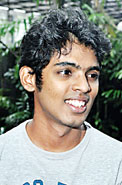Now, we also have Michael
Having won the Commonwealth Short Story Prize for the Asian region this young writer has added another voice to ‘gay- writing’ in Sri Lanka
Michael Mendis’ has never been interviewed before, if anything as a former journalist he’s used to being the interviewer. (“Hi Mum,” he says chirpily, when I switch the recorder on.) This month, the 23-year- old law student came out of nowhere to claim the Commonwealth Short Story Prize for the Asia Region and is now in the running for the overall prize which will be awarded on May 31.
Slight of frame and pathologically modest, Michael has a wide smile which he flashes often. It’s in full evidence when he talks about his first short story, an assignment written for his class when he was 8 or 9 years old. It began with a man contemplating his own death and ended in him winning the lottery – one of the few happy endings Michael has produced in over a decade of writing fiction. (It’s part of his ambition now, to author a few more.)

Michael Mendis
The story that won him the Commonwealth Prize was first simply titled ‘Incubus’ but has since morphed and stretched into ‘The Sarong-Man in the Old House, and an Incubus for a Rainy Night’. In it Wijey, an old man in his sixties, wanders around in ‘the house of green walls’, his mind consumed by memories of a boy named Krishnan. Michael orchestrates a tender encounter between Wijey and Krishnan, but take into consideration the opening paragraphs and that one of them is unconscious at the time and we already know how it will end.
Clearly for Michael it isn’t about the clever twist in the plot or the surprise ending. “My plots are very mundane, they’re very ordinary,” he says. “It’s not about shocking you with what is going to happen but shocking you by getting under these characters’ skins. The situation is mundane to us, but the feeling may not be, especially when it’s about being gay.” In fact, all the stories Michael has up on his website http://oilmanstreet.wordpress.com are “queer centric.” They’re also love stories, stories about longing and belonging, constructed from memories and laced with nostalgia. Michael believes that by simply placing them in a gay context they become socially and politically charged in the way his “hetero” love stories never were.
When he was contemplating which of his stories to submit for the prize, the one titled ‘Santhush’ garnered the most votes from friends (he chose to ignore its popularity in favour of the more sophisticated language in ‘Incubus’). ‘Santhush’ took him six months to write and was inspired by an assignment undertaken during his time as a journalist. He had taken up the job while still bearing up under a full academic workload – it meant six days a week of working till 9 p.m. every night and then heading back to his home in Moratuwa before crawling back to University and then to work. “It was horrible, I can’t believe I did that,” he says.
However, an assignment for an anniversary piece brought him to the village of Peraliya where the tsunami killed an estimated 1700 people trapped in a train, triggered grief and much thoughtfulness – Michael found himself noticing that among all the families and couples eulogised, one group received no mention. “Until that moment I hadn’t thought there must have been gay people on that train,” he says, “there was such an absence of acknowledgement.”
Michael wrote ‘Santhush’ in pursuit of a kind of catharsis, something he does anew with each story as he confronts things that concern him. “It’s about understanding the world, for that I need writing.” He’s currently working on a collection of short stories – he only likes four of the ten he has already put together and says he wants to produce better ones before he publishes. He’s learning as a writer to be less melodramatic and more self-contained, to structure his stories and to evolve a style more like his idols V.V. Ganeshananthan, and the Booker prize winning authors Anne Enright, Michael Ondaatje and Arundhati Roy. He has “a few beautiful paragraphs” from the novel he started writing when he was 19, but he’s going to wait to work on that one. “I realised I’m not old enough to write a novel,” he says, sharing his determination “that even if my third novel is terrible, my first novel has to be spot on.”
By incorporating gay characters and the issues they face into his work, Michael feels he is taking on a subject much neglected in Sri Lankan literature. “I don’t know if I’m being presumptuous but I think there’s a huge dearth of such writing,” he says. “We have only Shyam Selvadurai and perhaps Brandon Ingram.” Now, we’re happy to say, we also have Michael Mendis.
Follow @timesonlinelk
comments powered by Disqus


